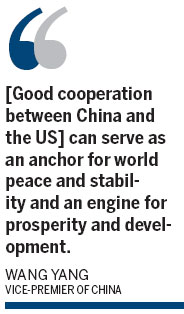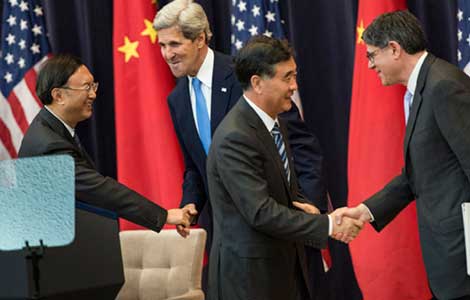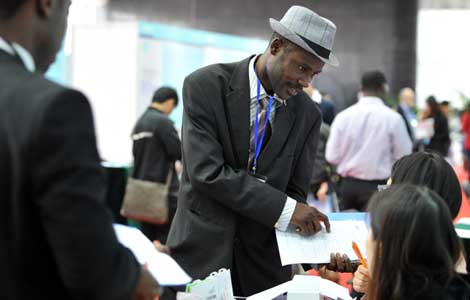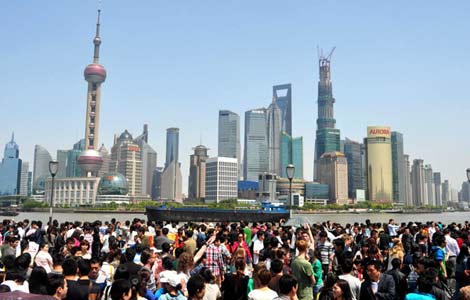Economic talks focus on growth
Updated: 2013-07-11 10:20
By Zhang Yuwei in New York (China Daily)
|
||||||||

|
Participants to the fifth China-US Strategic and Economic Dialogue pose for a photo on Wednesday in Washington. Sun Chenbei / China Daily |
The high-level US-China Strategic and Economic Dialogue, or S&ED, kicked off its fifth round of talks on Wednesday in Washington, with economic discussions focusing on "growth" of the world's two economic superpowers which are to "share the responsibility to work together cooperatively".
Chinese Vice-Premier Wang Yang and US Treasury Secretary Jack Lew co-chaired the economic track talks with the first day's session focusing on trade and investment and promoting cooperation.
It is a first for Wang, who took office in March, and for Lew, who became US Treasury chief in February, to host the annual high-level dialogue that was launched in 2009 for the US and China.
As the US and Chinese economies become increasingly interconnected, dialogue is better than confrontation and is important for both countries, Wang said.
Good cooperation between the two nations, said Wang, "can serve as an anchor for world peace and stability and an engine for prosperity and development".
The S&ED is seen by many as an opportunity to implement what Chinese President Xi Jinping and his US counterpart Barack Obama agreed to at the Sunnylands summit last month.
Wang said the current talks should "turn the important agreement between the two presidents into tangible outcomes and add substance to their new model of a major country relationship, so as to benefit the people of the two countries and around the world".
Lew said the two sides have begun "constructive discussions on a broad range of strategic and economic matters".
"As we gather here for a more detailed discussion of economic issues, the world is looking to our two economies to advance global prosperity and stability," said Lew.
"We are the world's two largest economies, and we both share the responsibility to work together cooperatively, even sometimes in the face of our differences," he added.
Lew said the new round of talks presents "a new set of opportunities and challenges", with the US focusing on further strengthening its economy with signs of improvement in recent job and economic growth and China focusing on reforms to sustain and broaden the growth of its middle class.

"Since job growth resumed, private employers have added more than 7 million jobs, and manufacturing has registered the strongest period of job growth, in percentage terms, since 1986," said Lew.
"Our financial system is stronger, with far more effective oversight than before the crisis," said Lew, adding that in order to protect these gains, the US should be on a path of fiscal sustainability while making investments to promote cleaner energy, jobs, and growth.
With wages rising and its labor force falling, China cannot continue to rely on cheap, low-skilled labor, and large capital investment, if it is to continue on the path of growth and development, Lew said.
While issues such as cyber security will be on the agenda, experts believe the core discussion for this high-level dialogue is to promote economic cooperation between the world's two largest economies.
The economic track talks on day two will include promoting sustainable and balanced growth and financial stability reform, according to a senior Treasury official on a background call on Wednesday.
"The SE&D has become institutionalized, which is very significant as the two great powers learn to adjust to the changing global power structure," said Zhu Zhiqun, a professor of political science and international relations at Bucknell University. "They have to learn to expand areas of cooperation and to minimize or manage areas of conflict."
Experts said a series of issues - including quantitative easing - will be high on the economic track agenda during the two-day event.
The S&ED talks are taking place after recent volatility in global markets in reaction to Federal Reserve Chairman Ben Bernanke's remarks on the tapering off of quantitative easing - the Fed's massive bond purchasing program - and ending the QE3 by mid-2014 if the economy improves as expected.
"Ending QE3 essentially brings a stop to stimulus and the US still remains the largest economy in the world with most of its GDP coming from consumer spending," said Daniel Hwang, chief foreign-exchange strategist at New York-based Gallant Capital Markets. "An end to stimulus would likely lead to higher savings and less consumer spending in the US, which is a concern for many foreign export-based economies in Asia."
The US added 195,000 jobs in June, with a 7.6 percent unemployment rate, close to a four-year low, according to a Labor Department report. This puts what Bernanke said about tapering and ending the QE3 on schedule, said experts.
yuweizhang@chinadailyusa.com
(China Daily USA 07/11/2013 page16)

 China investigates GSK executives for bribery
China investigates GSK executives for bribery
 China, Russia complete 3-day joint naval drill
China, Russia complete 3-day joint naval drill
 US drone completes 1st carrier landing
US drone completes 1st carrier landing
 Sino-US talks 'help build trust'
Sino-US talks 'help build trust'
 Boston Marathon bombing suspect pleads not guilty
Boston Marathon bombing suspect pleads not guilty
 Caution urged in seeking experts from abroad
Caution urged in seeking experts from abroad
 Shanghai struggles with growth
Shanghai struggles with growth
 Trade town turns to tourism
Trade town turns to tourism
Most Viewed
Editor's Picks

|

|

|

|

|

|
Today's Top News
Senators skeptical about Smithfield deal
Beijing has world's most delayed airport
Caution urged in seeking experts from abroad
Snowden is likely Venezuela bound
Talks 'help build trust' between China, US
Obama pushes House Republicans on immigration
Chinese researcher pleads guilty in US drug case
US Navy completes 1st unmanned carrier landing
US Weekly

|

|






